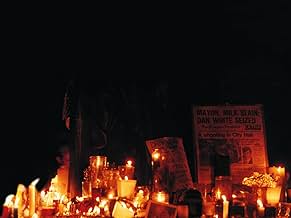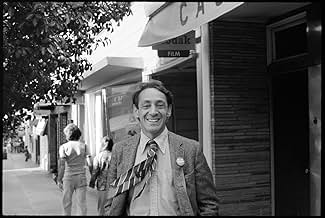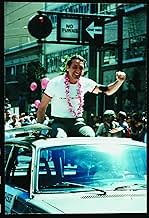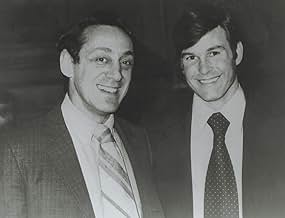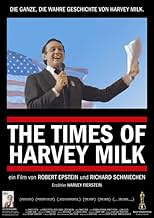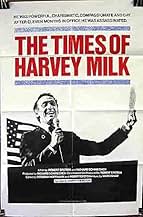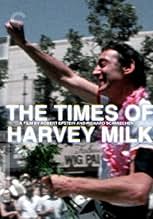CALIFICACIÓN DE IMDb
8.2/10
6.9 k
TU CALIFICACIÓN
Sobre la exitosa carrera y el asesinato del primer supervisor municipal gay electo de San Francisco.Sobre la exitosa carrera y el asesinato del primer supervisor municipal gay electo de San Francisco.Sobre la exitosa carrera y el asesinato del primer supervisor municipal gay electo de San Francisco.
- Dirección
- Guionistas
- Elenco
- Ganó 1 premio Óscar
- 11 premios ganados y 2 nominaciones en total
Harvey Milk
- Self
- (material de archivo)
John Briggs
- Self
- (material de archivo)
Jerry Brown
- Self
- (material de archivo)
Jimmy Carter
- Self
- (material de archivo)
Dianne Feinstein
- Self
- (material de archivo)
- (as Mayor Dianne Feinstein)
David Fowler
- Self - TV Interviewer of Dan White
- (material de archivo)
Joseph Freitas
- Self
- (material de archivo)
Terence Hallinan
- Self
- (material de archivo)
George Moscone
- Self
- (material de archivo)
- Dirección
- Guionistas
- Todo el elenco y el equipo
- Producción, taquilla y más en IMDbPro
Opiniones destacadas
10pyotr-3
STUNNING. That's the only word to describe this film. If you haven't seen it, prepare to be amazed. Clear the room and remove any distractions because you won't want to miss a second of this remarkable recounting of the Harvey Milk story. Prepare to cry and scream, because you will do both.
"The Times of Harvey Milk" covers a bit of American history that almost NO Americans seem to know about, and this is a tragedy. Everyone should know about these events, and the astonishing, beautiful people who participated in them. Perhaps the most stunning moment to me comes when a red-haired straight woman, who became a frequent customer in Harvey Milk's camera & film-processing shop, recalls the night after Milk and Mayor Mosconi were killed. Her description, her face, and her tears make me cry every time I see it. And when Dan White was given a slap on the wrist for murdering Milk and Mayor George Mosconi... because the jurors thought he was under the influence of too many TWINKIES... the city erupted. The film of these riots is stunning, and you may find yourself wishing that you could be there with the rioters who STOOD UP to this historic injustice and demonstrated their rage.
People of all ages and all political persuasions will find this film a remarkable document of an important bit of American history. I believe it is essential viewing for all.
"The Times of Harvey Milk" covers a bit of American history that almost NO Americans seem to know about, and this is a tragedy. Everyone should know about these events, and the astonishing, beautiful people who participated in them. Perhaps the most stunning moment to me comes when a red-haired straight woman, who became a frequent customer in Harvey Milk's camera & film-processing shop, recalls the night after Milk and Mayor Mosconi were killed. Her description, her face, and her tears make me cry every time I see it. And when Dan White was given a slap on the wrist for murdering Milk and Mayor George Mosconi... because the jurors thought he was under the influence of too many TWINKIES... the city erupted. The film of these riots is stunning, and you may find yourself wishing that you could be there with the rioters who STOOD UP to this historic injustice and demonstrated their rage.
People of all ages and all political persuasions will find this film a remarkable document of an important bit of American history. I believe it is essential viewing for all.
10PDWadler
This is a very important film, documenting the coming-of-age of LGBT involvement in the political process. Made just a few years after the Milk/ Moscone assassinations, it expertly captures the mood of a community, pre-AIDS, poised to assume political power.
The climax of the film is the peaceful, strangely silent, candle-lit march up Market Street from the Castro, the center of San Francisco's gay male community. The gay community's response to horrific violence is shock and love. When I show this film to young (mostly heterosexual) student audiences, there is always a collective gasp as they see the throngs of silent marchers.
The climax of the film is the peaceful, strangely silent, candle-lit march up Market Street from the Castro, the center of San Francisco's gay male community. The gay community's response to horrific violence is shock and love. When I show this film to young (mostly heterosexual) student audiences, there is always a collective gasp as they see the throngs of silent marchers.
10Ozdachs
I felt it was a powerful film as I saw it as a new arrival in SF in 1984. I didn't understand its power, though, until the documentary ended and the theather kept the lights very low. As I got up and started walking to the exit, I realized that most of the audience kept their seats. Very odd, since the credits and EVERYTHING had ended. The folks were just sitting and crying.
Art has historically been used to let people rethink and understand the events of their times. (Think Shakespeare.) This film is that type of "art".
Art has historically been used to let people rethink and understand the events of their times. (Think Shakespeare.) This film is that type of "art".
10bandw
The title of this excellent documentary is well chosen, since it is as much about a time and a place as it is about Harvey Milk. The time is the late 1970s and the place is San Francisco. After quickly covering some biographic details the movie concentrates on Milk's campaign to get elected to the San Francisco Board of Supervisors. After three unsuccessful attempts he wins, becoming the first openly gay man to be so elected. As much of a breakthrough as that was, it must be kept in mind that Milk was elected representing a heavily gay district.
Things have changed a lot in thirty years, since some U.S. congressmen are now openly gay. But the issue of acceptance of homosexuality is still contentious, as proved by the passage in 2008 of Proposition 8 that changed the California Constitution to ban gay marriage. This documentary is relevant since it shows where things started to change.
A good part of the film is devoted to consideration of California's Proposition 6 that was put before the public in 1978. Proposition 6 would have banned gays and lesbians from working in public schools. Of course Milk was heavily involved in opposition to the Proposition and it was a peak moment for him and the gay community when the proposition failed. The filming of the celebration of this in the gay community is a high point of the film.
It was only shortly after the defeat of Proposition 6 that Milk and San Francisco Mayor George Moscone were assassinated by Dan White, a fellow supervisor who had recently resigned, but was seeking reinstatement. The spontaneous candlelight vigil on the evening of the assassination that comprised some 40,000 people marching from the Castro neighborhood to City Hall was captured on film from the roof of a nearby building and is an exceedingly moving emotional highlight of the film.
This film is clearly tilted to present Milk in a favorable light and indeed that is not difficult, since Milk's charisma comes across strongly. However, it is mentioned that Milk was subject to fits of anger and could be difficult to work with. Also, Dan White's anguished testimony at his trial is played and he seemed genuine in his expression of regret, but hardly enough to exonerate him in the minds of most people. When White got what was considered a light seven year sentence, the ugly rioting and vandalism that resulted were not whitewashed. White was released from prison after serving five and a half years and committed suicide less than two years later. So, in the end he paid the price for his crimes.
The interviews with some of Milk's associates almost ten years after his assassination are very effective. They are all articulate and insightful about themselves and the history of the times of Harvey Milk.
The use of documentary footage from the time is effective and either a gay or a straight can appreciate this documentary as history.
Things have changed a lot in thirty years, since some U.S. congressmen are now openly gay. But the issue of acceptance of homosexuality is still contentious, as proved by the passage in 2008 of Proposition 8 that changed the California Constitution to ban gay marriage. This documentary is relevant since it shows where things started to change.
A good part of the film is devoted to consideration of California's Proposition 6 that was put before the public in 1978. Proposition 6 would have banned gays and lesbians from working in public schools. Of course Milk was heavily involved in opposition to the Proposition and it was a peak moment for him and the gay community when the proposition failed. The filming of the celebration of this in the gay community is a high point of the film.
It was only shortly after the defeat of Proposition 6 that Milk and San Francisco Mayor George Moscone were assassinated by Dan White, a fellow supervisor who had recently resigned, but was seeking reinstatement. The spontaneous candlelight vigil on the evening of the assassination that comprised some 40,000 people marching from the Castro neighborhood to City Hall was captured on film from the roof of a nearby building and is an exceedingly moving emotional highlight of the film.
This film is clearly tilted to present Milk in a favorable light and indeed that is not difficult, since Milk's charisma comes across strongly. However, it is mentioned that Milk was subject to fits of anger and could be difficult to work with. Also, Dan White's anguished testimony at his trial is played and he seemed genuine in his expression of regret, but hardly enough to exonerate him in the minds of most people. When White got what was considered a light seven year sentence, the ugly rioting and vandalism that resulted were not whitewashed. White was released from prison after serving five and a half years and committed suicide less than two years later. So, in the end he paid the price for his crimes.
The interviews with some of Milk's associates almost ten years after his assassination are very effective. They are all articulate and insightful about themselves and the history of the times of Harvey Milk.
The use of documentary footage from the time is effective and either a gay or a straight can appreciate this documentary as history.
10jcb9
"The Times of Harvey Milk" is one of my two favorite documentaries of all time, along with "Roger & Me." Through interviews with his friends, acquaintances, and political allies, Harvey Milk is really brought to life and a wonderful and inspirational human being. It's an especially moving story for me, since I grew up in Berkeley, just across the Bay from San Francisco - but you can enjoy this movie regardless of where you're from. I've seen "The Times of Harvey Milk" about five times now, and I've cried every time. Just thinking of the opening shot of Diane Feinstein saying, "Mayor Moscone and Supervisor Harvey Milk have been shot - and killed" to a shocked crowd of reporters chokes me up.
¿Sabías que…?
- TriviaSelected for preservation by the National Film Registry in 2012.
- ErroresWhen describing Harvey Milk's murder, the narrator states that Dan White killed Milk in Milk's own office. In reality, White asked Milk to come into White's former office, closed the door, blocked it with his body, and shot Milk.
- Citas
[last lines]
Harvey Milk: I know that you cannot live on hope alone, but without it, life is not worth living. And You... And You... And You... Gotta give em hope. Thank You very much.
- Bandas sonorasYou Make Me Feel (Mighty Real)
Performed by Sylvester
Written by Sylvester & James Wirrick (as Tip Wirrick)
Tim McKenna (Borozi Music Artists)
Fantasy Records
(c) 1978 Rights Donated
Selecciones populares
Inicia sesión para calificar y agrega a la lista de videos para obtener recomendaciones personalizadas
- How long is The Times of Harvey Milk?Con tecnología de Alexa
Detalles
- Fecha de lanzamiento
- País de origen
- Sitio oficial
- Idioma
- También se conoce como
- Wer war Harvey Milk?
- Locaciones de filmación
- Productoras
- Ver más créditos de la compañía en IMDbPro
Taquilla
- Total en EE. UU. y Canadá
- USD 13,801
- Fin de semana de estreno en EE. UU. y Canadá
- USD 2,213
- 17 sep 2000
- Total a nivel mundial
- USD 46,573
Contribuir a esta página
Sugiere una edición o agrega el contenido que falta


